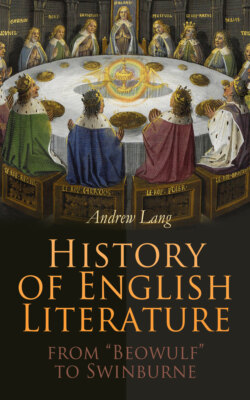Читать книгу History of English Literature from "Beowulf" to Swinburne - Andrew Lang, Robert Kirk - Страница 75
На сайте Литреса книга снята с продажи.
Barbour.
ОглавлениеSetting aside the enigmatic Huchown already discussed, John Barbour, author of "The Brus," a history of King Robert Bruce in rhyming octosyllabic couplets, is the first poet of English speaking Scotland. He remains one of the most spirited and readable; the most like Sir Walter Scott, who used his book in poetry and in prose historical writing.
By 1357 Barbour was Archdeacon of Aberdeen: he was probably born at least ten years before Chaucer. In 1357 he went, with others, to study at Oxford, probably at the Scottish college, Balliol. He also visited France, for studious purposes; he held a position in the Exchequer, and, after finishing "The Brus" in 1376, received a pension from Bruce's grandson, Robert II: other pensions he received: he died in 1396. He had written other works, lost or disputable, and a romantic genealogy of the Stuarts, who were really Fitz Alans, and of ancient Breton origin, not, as was fabled, of the old Scoto-Irish dynasty. "A Buik of Alexander" (the romance of Alexander the Great), is attributed to Barbour with much probability.
Barbour possesses, unlike most of the narrative poets of the Middle Ages, one supreme advantage. He is not telling, for the twentieth time, the Tale of Troy, of Alexander the Great, of King Arthur, or of any dim mythical hero. The events in the history of Scotland which his own father witnessed, make one of the best stories in the world. Bruce was far from a faultless hero, but his adventures are picturesque facts, not inventions: though sometimes Barbour tells the same story twice, with variations. His many defeats, his wanderings in the heather, with a little company or with a single attendant; his flight over sea; his crossings of perilous lochs in frail boats; his single combats; the desperate chivalrous valour of his brother Edward; his own sagacity as a strategist and tactician; his kindness of heart; his love of the romances; the sufferings of his loyal friends, men and women; all his days of almost desperate warfare; all his escapes when surrounded in the hills of Galloway and of Argyll, are matters of historical fact, and can often be traced in English documents of the time. His "crowning mercy" Bannockburn, is as historical as Marathon or Waterloo.
When we think of the wild scenes in which Bruce warred and wandered, Loch Trool, Loch Awe, the whole of the Lennox, the uplands of Don and Dee; when we remember the blending of English armed knights, and of the plaided clans in the ranks of his enemies; his own combination of the Islesmen with "the dark impenetrable wood" of the Lowland spears; the many-hued silks of the standards; the cowled friars who prayed while the warriors fought; the fair ladies who shared the hero's dangers, we see that Barbour has a theme fresh, brilliant, and unique for his poem. He has a true story which is more thrilling than any invented romance.
Barbour notoriously, perhaps in the interests of poetic perspective, rolls up three Bruces, the grandfather, the father, and the hero himself, into one personage. Yet his statements of the numbers of the English engaged are sometimes corroborated by the English muster rolls. Before he has written three hundred lines he strikes the sonorous keynote of his narrative in that praise of Freedom which is worthy of the poet who fought at Marathon.
"Ah! freedom is a noble thing!"
In what other mediaeval romance can these lines be equalled? What wearies us in Barbour is the common defect of mediaeval poets, the occasional display of learning, references to what Cato did, or Hannibal, or Scipio, and the like, but Barbour is not tedious when, after giving a minute portrait of the good Lord James of Douglas, he compares him to Hector, though, for valour,
To Hector dare I none compare
Of all that ever in world were.
The story never drags, adventure follows adventure, and there is none of the weary exaggeration of romance. Bruce does not slay his thousands, like Arthur. When he, a mounted man in armour, Ms the better of three plaided clansmen, MacNaughton, who is of the hostile party, cries
Surely, in all my time,
I never heard, in song or rhyme,
Tell of a man that so smartly
Displayed such great chivalry.
But Bruce is soon obliged to give his horse to one of the ladies, and go on foot, like Prince Charles, living on such venison as his arrows may procure. Barbour has to invent no fanciful dangers; he knows the racing tides and dangerous shoals of Argyll—
The waves wide that breaking were,
Weltered as hills, here and there.
Unlike Chaucer, Barbour has a scorn of astrology: no man ever (he says) made three correct prophecies, by knowledge of the stars! He is far from scrupulous, and does not blame Douglas when, like Achilles, he slays prisoners of war: apparently because he could not take them with him in his retreat, and secure their ransoms. Barbour has not, of course, the genius of Chaucer; but he has a touch of the genius of Scott, he has spirit, and a true sense of loyalty, chivalry, and patriotism; these, with his subject, place him beside Chaucer in so far as that he may still be read with unaffected enjoyment.
